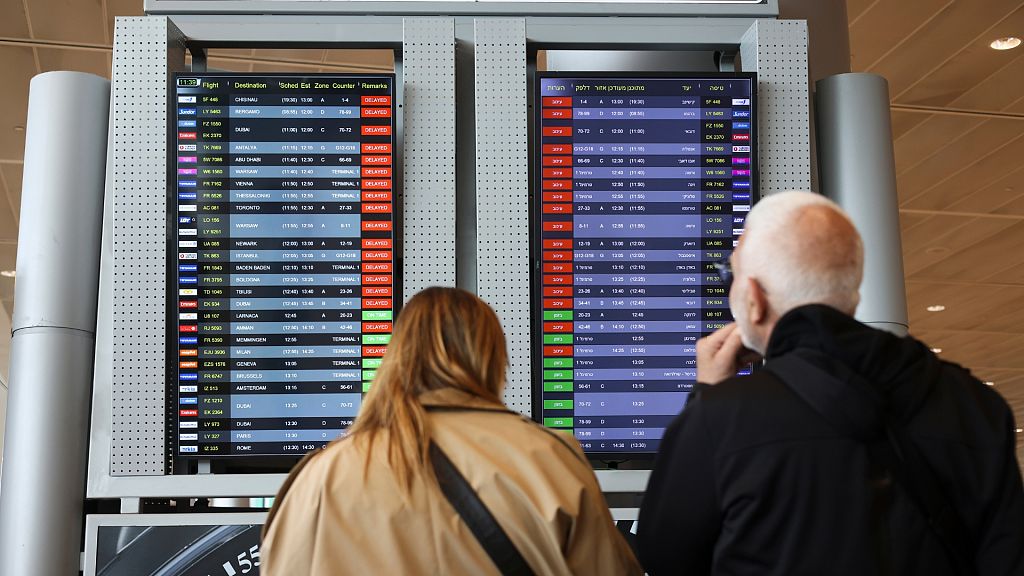Thousands of passengers are facing major disruptions to flights today after Israel launched attacks on targets in Iran.
Airspace across Iran, Iraq, Israel and Jordan was plunged into chaos after Israel launched a missile attack on Iran early Friday morning. It prompted a scramble to divert dozens of flights and alter scheduled services, leaving thousands of passengers stranded in unexpected destinations.
Tel Aviv’s Ben Gurion Airport is closed until further notice, and major carriers including Emirates, Lufthansa, Air France, United, and Delta have cancelled flights to the region.
If you are travelling in the region or have a trip planned, here are the latest updates and advice from authorities.
Flights halted to Israel airport and Iranian airspace closed
Dozens of flights to and from Israel’s Ben Gurion Airport were cancelled or delayed, including Etihad Airways, Delta Air Lines and Air France services.
Israel’s flag carrier, El Al Airlines, has suspended flights to and from Israel and has said it is moving some of its planes out of the country.
Israeli airline Israir is also evacuating its fleet from Tel Aviv’s airport, which it said was expected to remain out of operation over the weekend.
Related
Many international airlines had already halted services to and from the airport after a missile fired by Yemen’s Houthi rebels on 4 May landed nearby.
Iran, Iraq and Jordan have closed their airspace until further notice, according to local media and pilot updates.
Iraq has also suspended all traffic at its airports, according to state media reports. The country’s eastern border with Iran is one of the busiest air traffic corridors in the world, where many flights cross from Europe into Asia.
Flights over Iran diverted and rerouted
Iran’s Imam Khomeini International Airport swiftly halted both inbound and outbound traffic following the strike, with 16 flights cancelled so far.
Flights which were in Iranian airspace when news of the strikes hit were diverted or returned to their point of departure.
Air traffic is now being diverted either south, via Egypt and Saudi Arabia, or north, via Turkey, Azerbaijan and Turkmenistan.
More than 10 international flights that were forced to change their routes landed at Heydar Aliyev International Airport in Baku, Azerbaijan. Among these flights were those operated by leading airlines such as AJet, Fly Dubai, Air Arabia, Jazeera Airways, Etihad Airways, and Turkish Airlines.
A total of 29 flights carrying 2,427 passengers were diverted to Cyprus, with 20 flights from Europe and the US landing in Larnaca and 9 in Pafos. Diverted passengers will be offered hotel rooms, local media said.
Which airlines have cancelled flights?
Lufthansa has suspended flights to Tehran and said it would avoid Iranian, Iraqi and Israeli airspace for the time being.
Low-cost carrier flydubai said it had suspended flights to Amman, Beirut, Damascus, Iran and Israel. Several other flights operated by the airline have been cancelled, rerouted or returned to their departure airports.
Emirates has cancelled flights to and from Iraq, Jordan, Lebanon and Israel. Qatar Airways has cancelled two scheduled flights to Damascus on Friday. Etihad Airways has also cancelled or rerouted services.
Related
Israeli airline El Al has cancelled all its scheduled flights to and from Israel on Friday and Saturday over security concerns and possible Iranian counterattacks, DPA reported. The airline, which is known for operating its routes even in times of conflict, urged passengers to make provisions for overnight stays abroad until the security situation changes.
El Al said it would allow passengers with departure tickets until 28 June to cancel them and convert them into travel vouchers.
New bookings for flights scheduled through 22 June have been suspended until the situation is clarified.
Many other flights have been cancelled, rerouted or returned to their departure airports. If you have a flight booked to affected countries, including Lebanon, Jordan and Azerbaijan, you are advised to monitor airline and airport websites closely for updates.
What is the latest government advice for travelling to Iran?
The UK’s Foreign, Commonwealth & Development Office (FCDO) advises against all travel to Iran.
It warns that British and British-Iranian dual nationals are at significant risk of arrest, questioning or detention.
Having a British passport or connections to the UK can be reason enough for the Iranian authorities to detain you, it adds.
If you choose to travel to Iran against official government advice, research your destinations and get appropriate travel insurance. Insurance should cover your itinerary, planned activities and expenses in an emergency.
Spain’s foreign ministry has issued a warning for Iran stating, “Current travel recommendations against travel to Iran under any circumstances are reiterated.”
It also says that it has not excluded the possibility of the situation deteriorating in the coming days. The ministry recommends travellers follow updates closely on the social media and communications channels of the Spanish Embassy in Tehran.
Romania’s Foreign Ministry (MAE) asked its citizens in Israel to notify their representatives in the country of their presence and to follow the instructions of local authorities.
The institution also issued a recommendation to avoid travel to Iran, in the context of Israel’s aerial strikes on Iranian nuclear installations.
Bulgaria’s Ministry of Foreign Affairs has similarly called on citizens who are in the territory of the Islamic Republic of Iran to leave the country immediately.
“Those who have to stay should strictly adhere to the security instructions of the local authorities, as well as regularly inform themselves about the situation, avoid places that are military sites or where events related to the gathering of many people are held,” the Foreign Ministry said.
Preventive measures to increase security in case of an escalation of the crisis were discussed, as well as possible approaches for the evacuation of Bulgarian citizens from the Middle East region.








